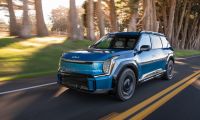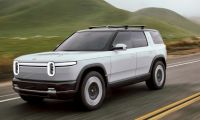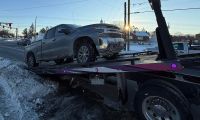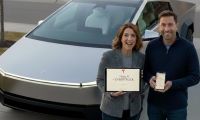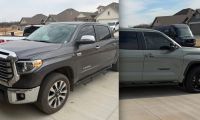Tesla’s vehicles are at the forefront of technology. Although the President doesn’t think of Tesla when he thinks of EV leadership, pretty much every EV advocate, fan, or owner does. As do many automotive industry professionals. Tesla’s vehicle production is sold out through much of the coming year, and the only thing stopping Tesla from selling more vehicles is its ability to build them faster. Despite these facts, Tesla still advertises and seems to “exaggerate” at times. At least that might be one conclusion.
How Tesla Advertises
Tesla doesn’t bother running pricey mass-market TV advertisements during sportsball games or cable news broadcasts. Why would Tesla do so? Its products sell far in excess of its ability to meet demand. More customers wanting more cars is not really a problem for Tesla to overcome right now. Yet, Tesla does still market its products. It simply does so more wisely than most companies. One way Tesla advertises is through direct-outreach email. At the bottom of the email advertisements Tesla sends me, Tesla writes, “This is promotional material for Tesla, Inc.”
Also referred to as opt-in advertising, this form of advertising is focused more on mindshare and branding than it is on expanding sales in the immediacy. I opt-in to Tesla’s email advertising because I find it interesting to see what Tesla wishes to communicate. Having shopped for Tesla vehicles on more than one occasion, I’m willing (maybe hoping) to be convinced the time is right for me to buy. Two recent Tesla advertisements sent to me by Tesla include one related to savings on fuel costs and another on maintenance. Let’s see what Tesla says in its wording and break the message down.
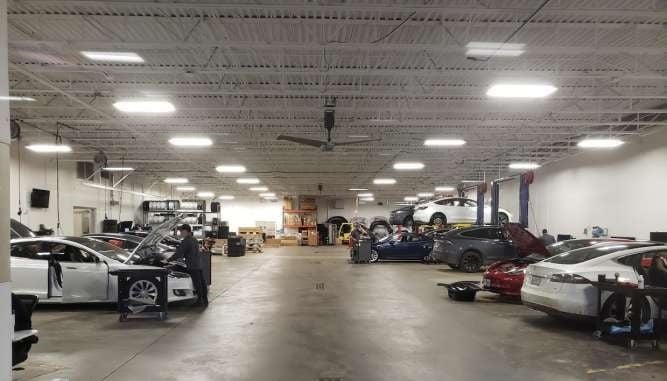
Tesla - No Regularly Required Maintenance
The advertisement that made me question Tesla’s message most is the one titled “No Regularly Required Maintenance.” Following the title of the email advertisement, Tesla says, “Model Y can save you time and money with fewer moving parts to repair and no regularly required maintenance. With every Tesla’s all‑electric architecture, you’ll pay less in potential upkeep compared to a traditional gas car.”
It’s fair to say that most people who understand the current state of the automotive industry would agree with the last sentence. Sure, who doesn’t expect a Tesla to cost you less in upkeep than a “traditional gas car.” But is it factual that Tesla’s Model Y has no “Regularly Required Maintenance?” We went to Tesla’s website to look at the Model Y’s manual. Inside, we found a whole section on maintenance. On the first page, Tesla carefully lists the maintenance the vehicle requires and the mileage intervals at which the company says it is required. For example:
-Rotate tires every 6,250 miles (10,000 km) or if tread depth difference is 2/32 in (1.5 mm) or greater, whichever comes first
-Brake fluid health check every 2 years (replace if necessary) or, if the vehicle is used for towing, replace the brake fluid every 2 years.
-A/C desiccant bag replacement every 4 years.
-Cabin air filter replacement every 2 years (or 3 years for HEPA filter, if equipped).
-Clean and lubricate brake calipers every year or 12,500 miles (20,000 km) if in an area where roads are salted during winter
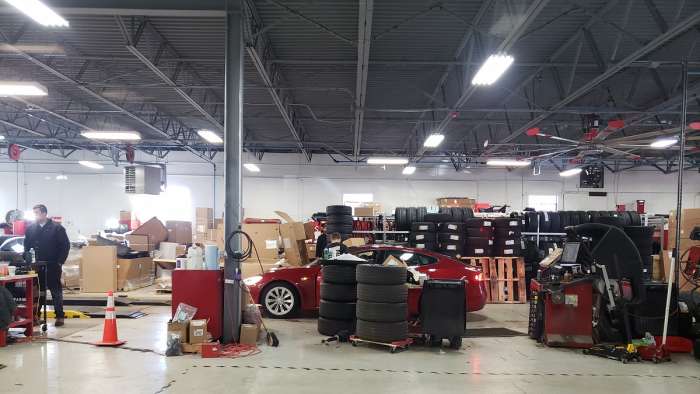
Tesla lists five different types of regularly-scheduled maintenance requirements for its Model Y. The most frequent is a tire rotation every 6,250 miles or sooner. Tires are often the most expensive category of vehicle maintenance. Do tires “not count?” What about brakes? Is there a reason why a brake inspection or brake fluid replacement should not be counted? Very few owners are going to perform this work themselves. What about the cabin air filter element? The timing of the replacement seems pretty specific. And that AC desiccant bag. Does it change itself? Are the replacement bags included with the car for later use?
Related Story: 2021 Shoppers Take Note: These Vehicle Brands Offer Valuable Included Maintenance
If Tesla included performing this maintenance in its purchase price for some set period of time, as many other manufacturers do, it would be fair to say that one doesn’t need to “pay for regularly scheduled maintenance.” But that’s not the case. Unlike Jaguar, BMW, Hyundai, and some other electrified vehicle makers, Tesla does not include a period of time during which it covers maintenance needs at no cost.
Do you feel Tesla is exaggerating? Do you feel Tesla’s claim is truthful? Tell us in the comments below.
Tesla Model Y–Never Pay for Gas Again
The second advertisement I recently received has to do with energy costs. Titled, “Model Y–Never Pay for Gas Again,” it seems pretty straightforward. Even a dummy like myself understands that if I own a vehicle that uses electricity for energy that I won’t have to pay for gasoline to power it. Duh.
The reason this one makes me question Tesla’s approach is the body of the advert. It says, “Charging at home is a fraction of the cost of paying for gas, saving you an average of $4,300 over six years.*” One might expect that there would be a place in the advertisement where that asterisk would be explained by some clever fine print. However, it’s a hyperlink that takes one to the general ordering page for a Model Y. Clicking that asterisk expecting more details and being taken to a purchasing page disappointed me.
If Tesla’s Model Y was the only crossover battery-electric vehicle available today, I’d be cool with the “Savings on gas” theme. However, Tesla’s Model Y wasn’t even the first BEV crossover in its segment. That would be the Jaguar I-PACE. One does not save $4,300 by opting for a Model Y instead of an I-PACE. If there were just one Model Y option, hey, we could let this Tesla comparison slide. But there are so many other BEV crossovers. The Ford Mustang Mach-E is very much like a Model Y and is now in its second year of sales. The VW ID.4 BEV crossover serves a customer on a tighter budget, but it uses no gas. The new Hyundai IONIQ-5 is being touted by many EV experts as the new benchmark in the BEV crossover segment. There are many BEV crossovers from many manufacturers, and none of them use any gas. So why does Tesla feel the need to tell me about $4,300 in potential savings? It’s either banal or misleading in my opinion. What’s your feeling about this? Are there Tesla shoppers who don’t know they won’t be buying gas?
Tesla has great products, is massively funded by stockholders in the game for the long-haul, has models that are recommended by Consumer Reports, and that earn IIHS Top Safety Pick Plus awards. The media (myself included) write stories explaining how Tesla’s Model Y outsells the entire fleet of SUVs at other respected brands. So why the direct-marketing adverts with what feel to this Tesla shopper a lot like the same old exaggerations from the bad old days of automotive retailing?
Tesla Model Y image courtesy of Tesla Media Support. Image of Tesla Dedham Mass. Tesla Service center by John Goreham. Image of Tesla Peabody Mass. Tesla Service center by John Goreham
John Goreham is a long-time New England Motor Press Association member and recovering engineer. John's interest in EVs goes back to 1990 when he designed the thermal control system for an EV battery as part of an academic team. After earning his mechanical engineering degree, John completed a marketing program at Northeastern University and worked with automotive component manufacturers, in the semiconductor industry, and in biotech. In addition to Torque News, John's work has appeared in print in dozens of American news outlets and he provides reviews to many vehicle shopping sites. You can follow John on TikTok @ToknCars, on Twitter, and view his credentials at Linkedin
Re-Publication. If you wish to re-use this content, please contact Torque News for terms and conditions.
Set as google preferred source







